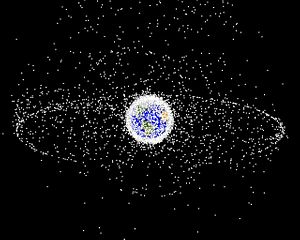Building on an initiative from the July 2014 U.S.-China Strategic and Economic Dialogue, China has formally requested that U.S. Air Force Space Command share information with Beijing that could help prevent future satellite and satellite debris collisions in space. This is information that the United States has already been sharing with China, but in the past, this was processed through the State Department. Given the latest Chinese request, U.S. Air Force Space Command would interface directly with China’s national space agency. It is likely that this new mode of cooperation will give the United States a better idea of how shared information is employed.
U.S. General John Hyten, the head of U.S. Air Force Space Command, received the request from the Chinese side. “The Chinese have asked to get data straight from our operations center to their operations center without going through State,” he said, according to a report by Colin Clark over at Breaking Defense. Hyten further added that in his view, the move was a “big deal.” As Clark notes in his report, the summary document emerging from July’s Strategic and Economic Dialogue included a clause noting that the Chinese Ministry of Foreign Affairs “committed to provide e-mail contact information for appropriate Chinese entities responsible for spacecraft operations and conjunction assessment, allowing these entities to receive Close Approach Notifications directly from the United States Department of Defense.”
This news comes at a time when U.S.-China competition in space is intensifying. The Chinese People’s Liberation Army (PLA) recently created a fifth branch devoted to space operations. Meanwhile, analysts warn that space could grow as a domain of competition between the U.S. and China. U.S. observers also express skepticism over China’s anti-satellite capabilities (though there is some disagreement as to how effective these capabilities are in reality). Based on the language referencing space following July’s Strategic and Economic Dialogue, the U.S. will rely on China’s Ministry of Foreign Affairs to ensure that the PLA, the China National Space Administration, and other related parties comply.
The U.S. Air Force Space Command data in question will be valuable in preventing unplanned collisions or accidents in outer space. China will likely have access to the United States’ orbital data. Gen. Hyten’s assessment of the move as a “big deal” is well-placed. This sort of direct communication between U.S. and Chinese specialized agencies without either country’s diplomatic bureaucracy serving as intermediary can only be positive. The move adds to an ever-growing list of ways in which the United States and China are expanding military-to-military relations.

































